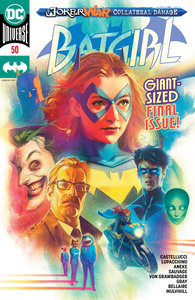Take a photo of a barcode or cover
A death is an end.
But it makes you look at your own life in a different way.
But it makes you look at your own life in a different way.
I feel bad for reading the final issue in the run and not the rest, but I intend to go back and read the entire title when I have time. I wanted to check out Ryan Wilder’s comic book debut before she hits the screen.
A colleague had already spoiled her intro to me (because people...) but as always, people are unable to understand context so he took her to be an upstart. Ryan only appears in two panels or so, but she’s part of a group of people who desperately need help in Gotham, but they’re being forgotten. I’m not happy that our first Black Batwoman is homeless and impoverished, but as this book itself shows us, the superheroes are too involved in their own lives and fights to care about the little guy.
Batman goes from being a billionaire to a millionaire and he’s worried about tightening his wallet. Yet, Robin gets an allowance and Dick gets a stipend (noticeably Barbara gets nothing). I’m glad Babs calls out Bats about wasting money on top down solutions and she eventually convinces him to fund homeless shelters that need the money. It’s funny that the creators address the top down approach—I recently talked about the same thing in my podcast.
One negative is that Batgirl is far too harsh with Nightwing. He was brainwashed and cruel to her, but that was not the intention. I would have preferred it if Babs explained that she wasn’t ready to take his olive branch yet because she was still processing how Dick had forgotten her, and his words while brainwashed. She needs time, but I don’t believe Babs hates Dick. But the text makes it look like that.
The entire story is full of hope and promises a continuation of Babs’ unwavering ability to help the people of Gotham. Yet, this is the final issue in the title, and Babs has now been relegated to customer service operator in the Batman title.
The creators of this book appear to be pleading Babs’ case that she’s a great superhero and an essential one. But fans and readers know that. They need to convince DC executives that the female heroes on their roster deserve prolonged runs as solo or lead protagonists.
Babs comes across as a vivacious, tenacious and generous hero, but her stories will always come up short because the powers that be don’t believe in her enduring appeal as a character and hero.
I liked the nods to real world issues, but I feel like the creators scaled it back far too often.
As much as I like this story and Babs in general, it’s hard to stay invested when you know that DC constantly pulls the plug on characters who aren’t Batman and Joker.
A colleague had already spoiled her intro to me (because people...) but as always, people are unable to understand context so he took her to be an upstart. Ryan only appears in two panels or so, but she’s part of a group of people who desperately need help in Gotham, but they’re being forgotten. I’m not happy that our first Black Batwoman is homeless and impoverished, but as this book itself shows us, the superheroes are too involved in their own lives and fights to care about the little guy.
Batman goes from being a billionaire to a millionaire and he’s worried about tightening his wallet. Yet, Robin gets an allowance and Dick gets a stipend (noticeably Barbara gets nothing). I’m glad Babs calls out Bats about wasting money on top down solutions and she eventually convinces him to fund homeless shelters that need the money. It’s funny that the creators address the top down approach—I recently talked about the same thing in my podcast.
One negative is that Batgirl is far too harsh with Nightwing. He was brainwashed and cruel to her, but that was not the intention. I would have preferred it if Babs explained that she wasn’t ready to take his olive branch yet because she was still processing how Dick had forgotten her, and his words while brainwashed. She needs time, but I don’t believe Babs hates Dick. But the text makes it look like that.
The entire story is full of hope and promises a continuation of Babs’ unwavering ability to help the people of Gotham. Yet, this is the final issue in the title, and Babs has now been relegated to customer service operator in the Batman title.
The creators of this book appear to be pleading Babs’ case that she’s a great superhero and an essential one. But fans and readers know that. They need to convince DC executives that the female heroes on their roster deserve prolonged runs as solo or lead protagonists.
Babs comes across as a vivacious, tenacious and generous hero, but her stories will always come up short because the powers that be don’t believe in her enduring appeal as a character and hero.
I liked the nods to real world issues, but I feel like the creators scaled it back far too often.
As much as I like this story and Babs in general, it’s hard to stay invested when you know that DC constantly pulls the plug on characters who aren’t Batman and Joker.
slow-paced
Plot or Character Driven:
A mix
Strong character development:
Yes
Loveable characters:
No
Diverse cast of characters:
Yes
Flaws of characters a main focus:
Complicated
Eh. I like the political throughline of some of the stories here, but if only getting politicians to give a fuck about people was as easy as this makes it seem. It’s depressing that it feels more unrealistic than the superhero tomfoolery, somehow.
Moderate: Ableism, Grief
Gentrification



